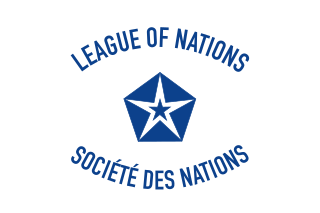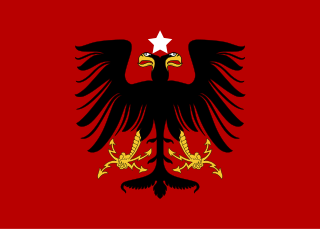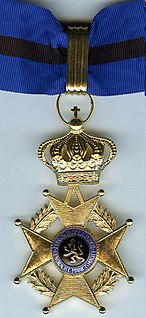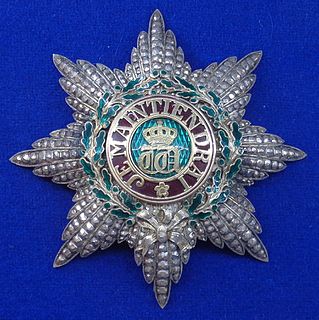
Albert I reigned as King of the Belgians from 1909 to 1934. This was an eventful period in the history of Belgium, which included the period of World War I (1914–1918), when 90 percent of Belgium was overrun, occupied, and ruled by the German Empire. Other crucial issues included the adoption of the Treaty of Versailles, the ruling of the Belgian Congo as an overseas possession of the Kingdom of Belgium along with the League of Nations mandate of Ruanda-Urundi, the reconstruction of Belgium following the war, and the first five years of the Great Depression (1929–1934). King Albert died in a mountaineering accident in eastern Belgium in 1934, at the age of 58, and he was succeeded by his son Leopold III.

William III was King of the Netherlands and Grand Duke of Luxembourg from 1849 until his death in 1890. He was also the Duke of Limburg from 1849 until the abolition of the duchy in 1866.

Albert Auguste Gabriel Hanotaux, known as Gabriel Hanotaux was a French statesman and historian.

Adolphe was the last sovereign Duke of Nassau, reigning from 20 August 1839 until the duchy's annexation to Kingdom of Prussia in 1866. In 1890, he became Grand Duke of Luxembourg following the death of King William III of the Netherlands, ending the personal union between the Netherlands and Luxembourg, until his own death in 1905. He was the first monarch of Luxembourg from the House of Nassau-Weilburg.
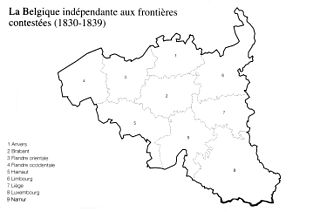
The Treaty of London of 1839, also called the First Treaty of London, the Convention of 1839, the Treaty of Separation, the Quintuple Treaty of 1839, or the Treaty of the XXIV articles, was a treaty signed on 19 April 1839 between the Concert of Europe, the United Kingdom of the Netherlands and the Kingdom of Belgium. It was a direct follow-up to the 1831 Treaty of the XVIII Articles which the Netherlands had refused to sign, and the result of negotiations at the London Conference of 1838–1839.
The German occupation of Luxembourg in World War II began in May 1940 after the Grand-Duchy of Luxembourg was invaded by Nazi Germany. Although Luxembourg was officially neutral, it was situated at a strategic point at the end of the French Maginot Line. On 10 May 1940, the German Wehrmacht invaded Luxembourg, Belgium and the Netherlands. Luxembourg was initially placed under a Military administration, but later became a civilly administrated territory and finally was annexed directly into Germany. The Germans believed Luxembourg to be a Germanic state, and attempted to suppress what they perceived as alien French language and cultural influences. Although some Luxembourgers joined the resistance or collaborated with the Germans, both constituted a minority of the population. As German nationals, from 1942, many Luxembourgers were conscripted into the German military. Nearly 3,500 Luxembourgish Jews were murdered during the Holocaust. The liberation of the country by the Allies began in September 1944, but due to the Ardennes Offensive it was not completed until early 1945.
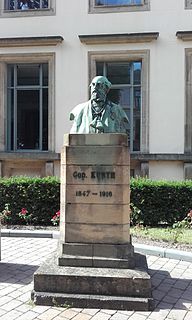
Godefroid Kurth (1847–1916) was a celebrated Belgian historian and pioneering Christian democrat. He is known for his histories of the city of Liège in the Middle Ages and of Belgium, his Catholic account of the formation of modern Europe in Les Origines de la civilisation moderne, and his defence of the medieval guild system.
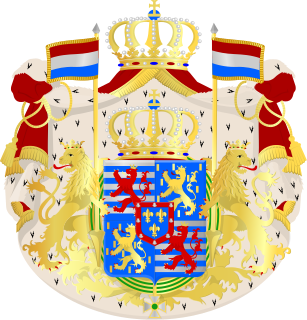
Princess Margaretha of Liechtenstein is the fourth child and second and youngest daughter of Grand Duke Jean of Luxembourg and Princess Joséphine-Charlotte of Belgium. As the sister of Grand Duke Henri of Luxembourg and the sister-in-law of Prince Hans-Adam II of Liechtenstein, she is a princess of two current realms and a member of the Luxembourg and Liechtenstein reigning dynasties. The Princess holds similar precedence in both monarchies, as sister and sister-in-law of the Sovereign.

Muslims in Luxembourg are a super-minority together with: Protestants, Orthodox Christians, and Jews. Since 2015, Islam is legally recognized in the country.

Prince Philippe of Belgium, Count of Flanders was the third born son of Leopold I, King of the Belgians and his wife Louise d'Orléans (1812–1850). He was born at the Château de Laeken, near Brussels, Belgium.
Gilbert Trausch was a Luxembourgish historian. He and other colleagues of the post-World War II generation of Luxembourg historians, such as Paul Margue, brought a new concern for Luxembourg's international relations to their study of its history.

Léopold Reichling was a Luxembourg biologist and naturalist.
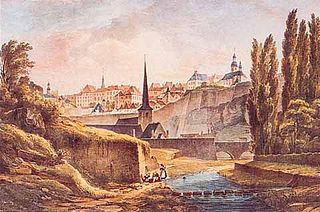
Jean-Baptiste Fresez (1800–1867) was Luxembourg's most important 19th-century painter. He is remembered above all for his almost photographic images of the City of Luxembourg.

Jean Paul Lehners is a Luxembourgish Historian specialized in the field of global and demographic history. He is also involved in the study of human rights. Jean-Paul Lehners is Professor of Global History and Holder of the UNESCO Chair in Human Rights at the University of Luxembourg.

The involvement of the Grand Duchy of Luxembourg in World War II began with its invasion by German forces on 10 May 1940 and lasted beyond its liberation by Allied forces in late 1944 and early 1945.
Guillaume "Guill" Konsbruck was a Luxembourgian military officer, politician, and manager of the steel company Arbed.
The Revolution of 1848 in Luxembourg was part of the revolutionary wave which occurred across Europe in 1848, in the Grand-Duchy of Luxembourg which at the time was in personal union with the Kingdom of the Netherlands. Dissatisfaction with inequality, an authoritarian government, a lack of civil liberties and a political system that excluded most people from government, caused widespread upheaval. This in turn forced the government to concede various reforms, particularly the granting of a new constitution, which introduced new civil liberties, parliamentary government, wider participation in the political system, and the separation of powers.

Albert Baertsoen was a Belgian painter, pastellist and graphic artist.
The Council of Luxembourg was the central institution in the government of the Duchy of Luxembourg from 1444 to 1795, in direct descent from the medieval council of the dukes. It was a body that had both administrative and judicial authority. The council was reorganized by Charles V in 1531–1532. Until 1782, legal decisions of the council could be appealed to the Great Council of Mechelen. On 1 August 1782 the council was made "sovereign", that is, the highest court in its jurisdiction.

